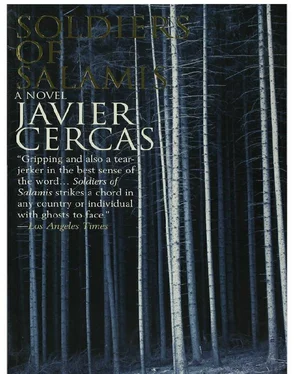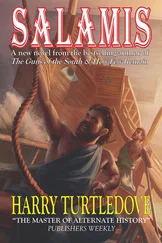Then he sees him. He's standing beside the ditch, tall and burly and silhouetted against the dark green of the pines and the dark blue of the clouds, panting a little, his large hands grasping the slanted rifle and the field uniform with all its buckles, threadbare from exposure. Prey to the aberrant resignation of one who knows his time has come, through his thick glasses blurred by the rain, Sánchez Mazas looks at the soldier who is going to kill him or hand him over — a young man, his hair plastered to his skull by the rain, his eyes maybe grey, his cheeks gaunt and cheekbones prominent and remembers him or thinks he remembers him from among the ragged soldiers who guarded them in the monastery. He recognizes him or thinks he recognizes him, but takes no comfort from the idea that it's going to be him and not a SIM agent who redeems him from the endless agony of fear, and it humiliates him like an injury added to all the injuries of these years on the run not to have died with his cellmates or not to have known how to die in an open field in broad daylight and fighting with a courage he lacked, instead of dying now and there, muddy and alone and shaking with dread and shame in an undignified hole in the ground. So, his mind raving and confused, Rafael Sánchez Mazas exquisite poet, fascist ideologue, Franco's future minister — awaits the shot that will finish him off. But the shot doesn't come, and Sánchez Mazas, as if he were already dead and from death remembering this scene from a dream, watches guilelessly as the soldier slowly advances towards the edge of the ditch in the unceasing rain and the threatening sound of soldiers and Carabineros, just steps away, the rifle pointing at him unostentatiously, the gesture more inquisitive than tense, like a novice hunter about to identify his first prey, and just as the soldier gets to the edge of the ditch the vegetal noise of the rain is pierced by a nearby shout:
'Is anyone there?'
The soldier is looking at him; Sánchez Mazas is looking at the soldier, but his weak eyes don't understand what they see: beneath the sodden hair and wide forehead and eyebrows covered in raindrops the soldier's look doesn't express compassion or hatred, or even disdain, but a kind of secret or unfathomable joy, something verging on cruelty, something that resists reason, but nor is it instinct, something that remains there with the same blind stubbornness with which blood persists in its course and the earth in its immovable orbit and all beings in their obstinate condition of being, something that eludes words the way the water in the stream eludes stone, because words are only made for saying to each other, for saying the sayable, when the sayable is everything except what rules us or makes us live or matters or what we are or what this anonymous defeated soldier is, who now looks at this man whose body almost blends in with the earth and the brown water in the ditch, and who calls out loudly without taking his eyes off him:
'There's nobody over here!'
Then he turns and walks away.
For nine days and nights of the brutal winter of 1939 Rafael Sánchez Mazas wandered through the region of Banyoles trying to cross the lines of the Republican army in retreat and pass over into the Nationalist zone. Many times he thought he wasn't going to make it; alone, no other resources than his will to survive, unable to get his bearings in unfamiliar territory of wild, dense woods, weakened to the point of exhaustion from walking, by the cold, hunger and three uninterrupted years of captivity, many times he had to stop to gather his strength in order not to let himself just give up. The first three days were terrible. He slept during the day and walked at night, avoiding the exposure of the roads and villages, begging for food and shelter at farms, and though he prudently dared not reveal his true identity at any of them, but rather introduced himself as a lost Republican soldier, and though almost everyone he asked gave him something to eat, let him rest awhile and gave him directions without asking questions, fear kept anyone from offering him protection. At dawn on the fourth day, after more than three hours wandering through dark forests, Sánchez Mazas made out a farm in the distance. Less by rational decision than out of utter fatigue, he collapsed onto a bed of pine needles and remained there, his eyes closed, barely sensing the sound of his own breathing and the smell of the dew-soaked earth. He had eaten nothing since the morning before, he was exhausted and felt ill, because not a single muscle in his body didn't ache. Until then the miracle of having survived the firing squad and the hope of encountering the Nationalists had given him a perseverance and a fortitude he'd thought lost; now he realized that his energy was running out and that, unless another miracle occurred or someone helped him, his adventure would very soon be at an end. After a while, when he felt a little restored and the sun shining through the foliage had instilled in him a scrap of optimism, he gathered all his strength, stood up and started walking towards the farm.
Maria Ferré would never forget the radiant February dawn she first set eyes on Rafael Sánchez Mazas. Her parents were out in the field and she was getting ready to feed the cows when a man appeared in the yard — tall, famished and spectral, with his twisted spectacles and many days' growth of beard, in his sheepskin jacket and trousers full of holes, and covered in mud and weeds — and asked her for a piece of bread. Maria wasn't scared. She'd just turned twenty-six and she was a dark blonde, illiterate, hard-working girl for whom the war was nothing more than a confusing background noise to the letters her brother sent home from the front, and a meaningless whirl wind that two years earlier had taken the life of a boy from Palol de Revardit she'd once dreamed of marrying. During this time her family hadn't been hungry or frightened, because the farm lands they cultivated and the cows, pigs and hens sheltering in the stables were enough, more than enough, to feed them, and because, although Mas Borrell, their house, was located halfway between Palol de Revardit and Cornellá de Terri, the abuses of the days of revolution didn't reach them and the disorder of the retreat brought them only the odd lost, disarmed soldier who, more frightened than threatening, asked for something to eat or stole a hen. It's possible that at first Sánchez Mazas was to Maria Ferré just another of the many deserters who roamed the area during those days, and that's why she wasn't scared, but she always maintained that as soon as she saw his pitiful figure outlined against the ground of the path that ran past the yard, she recognized beneath the ravages of three days' exposure to the elements the unmistakable bearing of a gentleman. Whether that's true or not, Maria gave the man the same kind treatment she'd given countless other fugitives.
'I don't have any bread,' she told him. 'But I could heat something up for you.'
Undone by gratitude, Sánchez Mazas followed her into the kitchen and, while Maria heated up the previous night's saucepan — where, in a rich, brown broth, floated lentils and big chunks of bacon, sausage and chorizo along with potatoes and vegetables — he sat down on a bench, enjoying the nearness of the fire and the joyful promise of hot food, took off his soaking shoes and socks, and suddenly noticed a terrible ache in his feet and an infinite tiredness in his bony shoulders. Maria handed him a clean rag and some clogs, and out of the corner of her eye watched him dry his neck, his face, his hair, as well as his feet and ankles, while watching the flames dance amid the logs with staring, slightly glazed eyes, and when she handed him the food she saw him devour it with a hunger of many days, in silence and scarcely forgoing the manners of a man raised among linen tablecloths and silver cutlery, which, more out of his courteous instincts than his recently acquired habit of fear, made him set the spoon and pewter plate down by the fire and stand up when Maria's parents burst into the half-light of the kitchen and stood, looking at him, with a bovine mixture of passivity and suspicion. Perhaps mistakenly thinking their guest didn't understand Catalan, Maria told her father in Catalan what had happened; he asked Sánchez Mazas to finish his meal and, without taking his eyes off him, put his farming tools down beside a stone bench, washed his hands in a basin and came over to the fire. As he sensed the father approach, Sánchez Mazas scraped the plate clean. His hunger calmed, he'd reached a decision: he realized that, if he didn't reveal his true identity, he wouldn't have the slightest chance of being offered shelter there either, and he also realized that the hypothetical risk of denunciation was preferable to the real risk of starving or freezing to death.
Читать дальше












